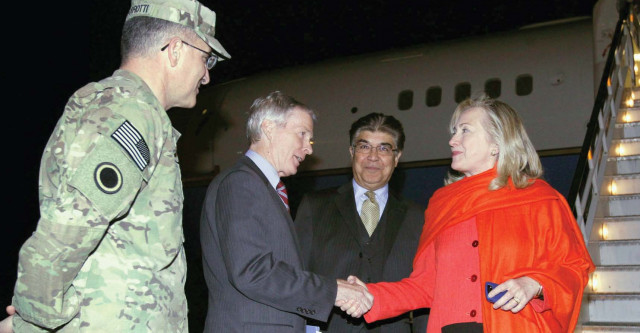Deciphering the roadmap: US, Pakistan to push for Afghan endgame deal
Secretary Clinton, Gen Dempsey and CIA chief Petraeus to share ‘blueprint’ in Islamabad.

The significance of the visit, official sources say, can be judged from the fact that Secretary Clinton will be accompanied by US Chairman Joint Chiefs of Staff General Martin Dempsey and Central Intelligence Agency Director David Patraeus.
It is a rare instance for the secretary of state, who arrived in Kabul on an unannounced visit on Wednesday, and the US military and intelligence chiefs to undertake a joint trip to Pakistan. “This is the first time that senior US officials are coming to Islamabad together and suffice to say discussions will be on the Afghan endgame,” said a senior security official.
Another official disclosed that Secretary Clinton was arriving in Islamabad to clear up the confusion about her country’s “options and proposals” on Afghanistan. “Frankly, so far the Americans have not shared their roadmap on Afghanistan with us,” the official added. “What confuses us is that we don’t know who is in charge in Afghanistan. Is it the Pentagon or the State Department? This is complicating matters,” he said.
Sensing the importance of the visit, Pakistan’s top civil and military leadership have done their homework and prepared a joint strategy, it is believed. According to the strategy, the contents of which have been shared with The Express Tribune, Pakistan will inform the US that sustainable peace in Afghanistan can only be achieved through a meaningful political reconciliation.
(Read: Afghan war anniversary: 10 years on, the answers are blowing in the wind)
What this means, one official explains, is discussions with insurgent groups. “There is a need to first identify reconcilable groups,” he said. Pakistan might also insist that the US drop preconditions attached to negotiations with the Afghan Taliban. “Afghanistan is a tribal society and they never accept any preconditions and we understand that the US is also now convinced,” the official added.
The strategy also talks of Pakistan’s fears regarding growing Indian influence in Afghanistan. “Pakistan has no issues if the US thinks that by giving India a lead role it will bring sustainable peace in Afghanistan. But obviously that is not the case,” the official pointed out.
(Read: Karzai‘s great gamble)
Another area of concern for Pakistan is the Afghan National Army. Pakistan argues that a 400,000-strong Afghan army will disband into splinter groups when the international forces led by the US pull out of the war-torn country. Based on this assumption, Islamabad believes that the US needs to rethink its strategy.
It is unclear whether the US will endorse Pakistan’s point of view given the differences between the two countries on some strategic issues, such as how to tackle the Haqqani network. The US has so far remained adamant in its demand for a military offensive against the group.
The Pakistan Army has resisted US pressure, though the army chief, General Ashfaq Parvez Kayani, told parliamentarians on Tuesday that if he was convinced that an operation in North Waziristan would bring about peace in Afghanistan, he would do it tomorrow.
Despite differences, experts say the countries have mutual interests. “Pakistan and the US don’t wish to see Afghanistan used against any third country,” said Rustam Shah Mohmand, former ambassador to Afghanistan.
Published in The Express Tribune, October 20th, 2011.



















COMMENTS
Comments are moderated and generally will be posted if they are on-topic and not abusive.
For more information, please see our Comments FAQ